Mad Hedge Technology Letter
March 9, 2018
Fiat Lux
Featured Trade:
(WHY CHINA IS DRIVING UP THE VALUE OF YOUR TECH STOCKS)
(QCOM), (AVGO), (AMD), (MSFT), (GOOGL), (AAPL), (INTC), (LSCC)

Mad Hedge Technology Letter
March 9, 2018
Fiat Lux
Featured Trade:
(WHY CHINA IS DRIVING UP THE VALUE OF YOUR TECH STOCKS)
(QCOM), (AVGO), (AMD), (MSFT), (GOOGL), (AAPL), (INTC), (LSCC)

Mad Hedge Technology Letter
March 8, 2018
Fiat Lux
Featured Trade:
(THE CODER BOOM)

Mad Hedge Technology Letter
March 7, 2018
Fiat Lux
Featured Trade:
(A STRAIGHT LINE TO PROFITS WITH SQUARE),
(AMZN), (JPM), (SQ), (TWTR), (WMT), (PYPL)

The recent rumor linking up Amazon (AMZN) with JP Morgan (JPM) to produce an Amazon branded bank account is not all that shocking.
Jeff Bezos seems to cause a stir with every finger he lifts.
But if I had to choose one man that will revolutionize the digital payment industry and banking it is not Jeff, but Square (CEO) Jack Dorsey.
Jack is the logical choice. Investors only need to see the proof in the pudding.
Without much hype, Jack Dorsey is in the midst of applying for a bank charter in the state of Utah.
This is in the form of an ILC (Industrial Loan Charter), only available in select states, which allows non-financial firms to enter the banking sector without any regulation or oversight by the Federal Reserve.
If you wondered why so many of your credit cards come for the Beehive State this is why.
This loophole would allow fintech companies to become fully-fledged financial players. ILC's are not subject to state licensing rules, which most legitimate banks must adhere to.
This is occurring during a more exaggerated backdrop of big tech scarcely being regulated at all. Small fines and slaps on the wrist don't meaningfully count.
Utah boasts over half of the ILC's currently in operation. The original purpose of the Utah ILC was to offer loans to blue collared workers around 1905-1910.
Other fintech companies employing this tactic is Sofi which Anthony Noto just took over and is part of the Softbank Vision Fund. Noto was the former COO of Twitter (TWTR) and was largely tabbed as the guy who turned around the ship there.
Lamentably, Anthony Noto left Twitter because of his aspirations to become a CEO, which was currently filled by Jack Dorsey. Yes, the same Jack Dorsey who is the CEO at Square.
Effectively, Anthony Noto left Twitter to duke it out with Jack Dorsey's other company Square. This has also given more credibility to Sarah Friar, CFO of Square, who just joined the Walmart (WMT) Board of Directors and is a true high flier.
It is assumed that with Noto's departure, Sarah Friar will pick up the slack at Square when Jack is putting Twitter's house in order across the street.
Sadly, Jack can't physically be in two places at one time. And an algorithm of himself has not been created yet.
Sarah Friar could be the next to jettison for a CEO position elsewhere as gaining a job credential from a Jack Dorsey company is digital crypto-gold.
At the micro level, Square is summed up by one number, GPV (Gross Payment Volume). It's the only metric investors look for. GPV on Square's platform surpassed $65 billion in 2017 and there no chance the upward trend will reverse in 2018.
Square (SQ) braggadocio stems from its brilliant pipeline of innovation.
The greatest benefit of being led by a super star visionary like Jack Dorsey is the high-quality offerings marinating in the pipeline.
Suffice it to say the quality is higher than relative to industry competitors allowing investors to double down on the Jack premium.
This was the same concept with the Steve Jobs premium at Apple (AAPL).
Once boards christen custodial type CEO's like Steve Ballmer and Tim Cook who are interested in shepherding the company instead of revolutionizing it, investors become disheartened for the lack of hyper-acceleration. Custodial CEO's tend to be reactive instead of proactive which is a self-defeating strategy.
Simply put, consumers love great products.
Investors are attracted to the fact that heavy hitters haven't adopted Square's services yet and Square is experiencing whirlwind momentum as they move upstream.
Up to this point, Square's success has been created on the back of small business growth. The momentum is a function of three points: product quality, distribution quality, and support services quality.
Over 80% of large merchants migrate to Square themselves. The easy to use platform directs these Fortune 500 companies effectively. They visit the website once, pay for the service they need, and do not need to communicate with anyone.
This vindicates the product existence and similar to Tesla (TSLA), they don't need physical dealers to sell. Customers find them and not the other way around.
Square Cash is fast becoming the millennial way to pay for things, which is Bearish for PayPal (PYPL). It's the easiest way to digitally send money. Cash is available for both personal and business use.
The Square Cash App is now available for trading Bitcoin (BTC) except for users in New York, Georgia, Hawaii, and Wyoming.
Even though the Bitcoin announcement will not drive the bulk of its business, the Bitcoin disclosure is a thinly veiled advertisement for its peers representing innovation and hyper-pace of transformation at Square.
This is the gumption that attracts top level engineers to Jack Dorsey's enterprises.
Other products that customers notice in stores is Square Register, which is a state of the art POS (Point of Sales) system. Also, there is Square Stand which is the iPad POS system that swivels around to customers from the cashier.
Square Capital is making inroads too with loan growth up 23% QOQ. Square capital provides business loans to small businesses. This is the part of the business that directly competes with SoFi.
On a financial level total net revenue is robust at $616 million QOQ, up 36% YOY and the 2018 calendar year will be even better for Square.
Square expect to offer expanding financial services for both sides of the transaction. The only limit to growth is its imagination, as is evident with the roll-out of new products almost every quarter.
Highlighting the extreme growth are invoices, virtual terminal, and e-commerce API payments, all commanding higher margins.
Subscription and service revenue rose 96% YOY. The ability for outsized growth of this scale through rapid product innovation and the chance to cross-sell into an embedded Square customer is essentially the cloudification seen in all tech companies these days.
In 2018, expect total net revenue to guide between $2.82 billion to $2.88 billion and represents a 32% YOY growth respectively.
Jack Dorsey is not a CEO to bet against and when a 96% bump in service and subscription revenue cannot even break into the top 3 reasons to buy this stock, investors know they have a gem on its hands.
Is the $1 billion Amazon (AMZN) just spent for a doorbell company ludicrous, or genius? This question becomes incredibly pertinent as the battle for the front door heats up.
Transcending cultures since the time of antiquity, a door is a portal to a man's kingdom, his inner space.
Doors were first used inside Egyptian tombs some 5,000 years ago, and the Roman god Janus was the overseer of doors long before Jeff Bezos came along. Doors still continue to encapsulate beginnings, endings, transitions, and time.
A door is first and foremost an entrance. A potential entrance for Amazon to capture market share before the rules of the road are set.
Once entering the main door, hallways are linked with other rooms and other doors that lead to other worlds, which Amazon will pursue once they enter the home.
An open door represents the future and opportunity for a new market. A locked door typifies failure, rejection, and imprisonment. Amazon has created a $700 billion business that stops right outside your door. It's time for them to take the next step.
What would be the monetizing synergies if consumers offer access to that front door and Amazon slowly moves deeper into the house?
The goal is to remove any layers, material or psychological, that stands between Amazon profits and customers.
The door must be beaten down, and convincing consumers its permissible to enter the family sanctuary could fuel another round of tech prosperity and hyper- accelerating tech integration into daily lives.
It is fundamentally impossible to live a practical life in 2018 with analog instruments such as quaint pencil and paper. Consumers are increasingly addicted to technology, and future business applications revolve around harnessing tech acumen which cannot be rooted out retroactively.
The FOMO (Fear of Missing out) phenomenon that has gripped the business world is putting a turbocharger on this trend.
Remember that big tech companies aren't regulated like normal companies and have a built-in license to destroy any industry they desire.
This is immensely bullish for tech stocks. Regulation just cannot keep up. Tech companies believe that they should not be liable or accountable for any unintended consequences. Witness the Russia affair.
By contrast, media companies are harshly regulated by the government, and their content is subject to intense scrutiny. Remember Janet Jackson's infamous "wardrobe malfunction" at the Super Bowl? Unfortunately, media companies do not receive a free pass like the FANG's.
The FANG's free pass has put the family abode directly in the firing line. Alphabet (GOOGL) understands this to full effect; the new $229 Nest Doorbell will be distributed with a free Google Home Mini this spring.
Google Nest was purchased for $3.2 billion in 2014, and was launched by former Apple (AAPL) engineers Tony Fadell and Matt Rogers.
Google Nest has been accused by Ring CEO Jamie Siminoff of stealing their product innovation. Ring is the distinct best of breed in this industry and complements Amazon Key, which automatically opens doors for verified delivery workers.
This was the first adventure into this space by CEO and founder Jeff Bezos and supplements Amazon's Alexa which can cross-integrate with 3rd party devices in over 35,000 unique ways.
In a world where the demarcation of ecosystem lines are clearer and clearer by the day, the FANG's are seducing users into a proprietary closed ecosystem and padlocking anyone that is currently inside.
Facebook (FB) and Google do not sell anything, they just want user time, especially platform user time, to accumulate data to hawk ads to advertisers.
Apple, which does sell something physical, wants customers to buy iPhones, HomePods, and pay for its mish mash of services that integrate under the umbrella of the Apple smart home.
The FANG's have similar yet competing strategies. It is unknown how fast homes will become smart, as we are in the first stage of smartification. But there are a certain set of battleground products such as smart locks, thermostats and security cameras already.
Thermostats are easy to use, and various firms contribute energy rebates for thermostats upgrades.
The $1 billion spent on Ring, or Google's $3.2 billion tab for Nest Labs are FANG's intent to take a major stab at overtaking the place you sleep at night by making it socially acceptable for corporate tech to venture and operate inside houses.
The goal is to create a seamless, automated, enjoyable experience all on one pay tab called the smart home. After a consumer buys multiple products from the same tech company, they investigate further how to connect and integrate all these offerings together.
Thus, the tech climate fiercely focuses on admission into a new ecosystem by any means necessary.
If Amazon can seize the house, it will seize everything that is inside.
Smart homes will not work if the smattering of products and services derive from all different makers. You have to choose a common platform.
Unsurprisingly, home security companies sold off on this news, and this new trend has thrown a spanner into the works for firms such as ADT Inc. (ADT) who have curated a 30% market share. They are the first on the chopping block.
This Boca Raton, Florida company specializes in offering security to residential and small business enterprises. They possess far more weight in the industry compared to rivals Johnson Controls International (JCI) and private firm Vivint.
ADT went public in January 2018 and expected to garner a price of $17-$19. ADT is trading below $11 today. Some of the headwinds analysts have previously mentioned are "increased competition", but nobody thought competition would come in the form of the most powerful company ever to be created in the history of mankind - Amazon. Ouch!
Ironically, in January 2016, Vivint, formerly known as??APX Alarm Security Solutions Inc, agreed to cooperate with Amazon and Nest. Vivint Element team is working on its own smart thermostat and the Vivint Ping Camera for front doors.
This is not a coincidence and the mutual connectivity in tech is everywhere. There are fewer degrees of separation between companies and industries than ever before.
Everyone is overlapping to the point where Amazon refuses to sell Google Nest products on its interface and Google stripping YouTube from all Amazon streaming devices. The more successful these smaller players become, the greater chance of a takeover by a more liquid player.
The FANG's have become juggernauts and any remnant of competition is undercut before it can become a threat and neatly placed under the umbrella of their greater visions.
This strategy has been rampant with botched attempts like Mark Zuckerberg's failed purchase of Snapchat (SNAP) for $3 billion in 2013 and Yahoo's failed buy of Facebook for $1 billion in 2006, just before Zuckerberg launched the fabled news feed.
Even though Vivint is not owned by a FANG, Blackstone Group acquired them for more than $2 billion in 2012.
If you look back in time, Amazon should have never become Amazon. Walmart should have bought it before it gained any traction. Same goes for search - Yahoo should have bought out Google before it became Google. Such is the incredible value of 20/20 hindsight.
Siminoff's Ring is now part of Amazon's death star. Ultimately, if doors are associated with privacy and protection and Amazon can successfully maneuver around these certain sensitive elements, its share will go ballistic.
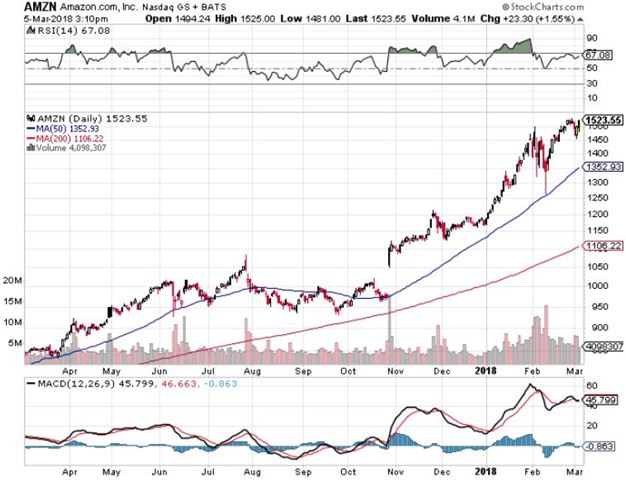
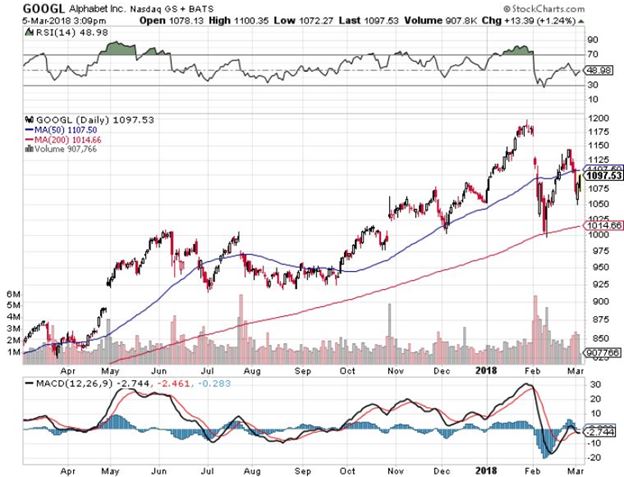
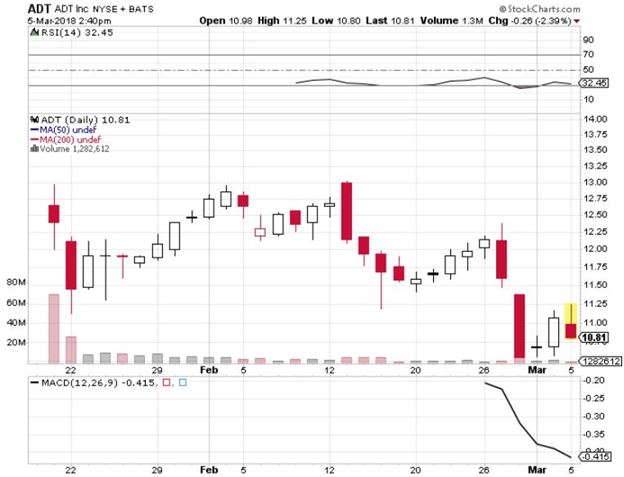
Mad Hedge Technology Letter
March 5, 2018
Fiat Lux
Featured Trade:
(IS THERE A TURNAROUND PLAY AT WESTERN DIGITAL?),
(WDC), (MSFT), (NVDA), (STX), (INTC), (CSCO), (SNAP), (GPRO), (APRN), (CRM), (NFLX)
There is a new investment theme that is starting to permeate Silicon Valley.
It hasn't gone mainstream yet but is starting to attract attention because of the spectacular numbers it will bring in.
I call it the "Legacy Turnaround Play."
It goes something like this. Find an ailing technology dinosaur from the Jurassic Period (i.e. the 1990's), infuse it with new management and technology, and the shares go ballistic.
The poster boy for the strategy is none other than the former beast of Redmond, Washington, Microsoft (MSFT), founded by my friends Bill Gates, and the company supervising adult, Paul Allen.
Up until the Dotcom bust, it looked like Microsoft would rule the universe forever. Almost two decades later, its Windows operating system still runs 70% of the world's computers.
The day Bill Gates retired from active management was the day (MSFT) went ex-growth. Steve Ballmer was never more than the custodian of a gigantic legacy business that went nowhere. The shares remained stuck in the doldrums for 15 years.
Also on that fateful day the Gates Foundation sold the bulk of its Microsoft shares, investing tens of billions of dollars into US Treasury bonds. I know this because I reviewed the fund's holding many years ago. It was one of the wisest investment decisions ever made.
Steve Ballmer mercifully retired in 2014, hiring Satya Nadella to replace him. The pick was controversial at the time because Nadella hailed from India.
However, he possessed a vision of The Cloud that was way ahead of its time and proved dead on correct. Since Nadella joined Microsoft, the shares have rocketed some 163%.
This has spurred a frantic search for the next Microsoft, and every legacy tech company is being put under a microscope to ascertain its possibilities.
Intel (INTC) and Cisco Systems (CSCO) are now in the running for "Legacy Turnaround" status, and their share prices are reacting accordingly.
The Silicon valley jungle telegraph has told me that another firm may be about to join its ranks.
That would be Western Digital (WDC). However, the burden of proof is still on the company's management.
You all remember the old Western Digital. Spun off from Emerson Electric Company, Western Digital was the world's largest manufacturer of chips for hand held calculators during the 1970s, the cutting-edge consumer technology product of its day. When the personal computer industry showed up, it moved rapidly into hard drives.
Since then, it hasn't really done anything new, except build bigger and faster hard drives in physically smaller sizes. The problem with that approached is that the world has been moving towards solid state storage now for years.
The hard drive is about to become one of the great dodo birds in the history of technology. Western Digital's shares are virtually unchanged in three years, completely missing the 2016-2018- tech melt up.
You can forget about buying Western Digital (WDC) for a quick-in-and out trade. HDD (Hard Disk Drive) sales are down a dreadful 5.6% YOY.
It was hard to identify a tech stock that didn't have a phenomenal year in 2017 unless it was tainted with terrible offerings like Snapchat (SNAP). The secular long-term growth story for technology is the crux of the bullish argument in equities.
A good chunk of Western Digital's business is derived from the declining HDD storage industry which is a continuing source of torment.
(WDC) is attempting to cross over into SSD (Solid State Drives) which is ripe for hyper-growth in tech storage. Gobbling up SanDisk in 2016 and Tegile Systems in 2017 were definitely positive steps in the right direction.
In 2014, HDD was a pristine $32 billion per year market, but sunk to $20 billion by 2017.
Begrudgingly, (WDC) dominate 40% of the HDD market along with Seagate (STX) who also control roughly 40% of market share.
HDD revenues still comprise the biggest portion of WDC's total revenue.
Once that number shrinks down to 30-35% then a resurgence in the stock could be in the cards and management can start beating the drums of resuscitation.
(WDC) sold off hard after last quarter's earnings first and foremost because of the bitter tussle with Toshiba who is mired in years of chaotic management and mislead investors.
Traders dumped the stock after finding out guidance for earnings per share between $3.20 and $3.30 down from the previous quarter of $3.95.
Making matter worse, (WDC) lost over $800 million last quarter. (WDC) undeniably have a few dilemmas to solve.
Contrarians can argue that (WDC) is cheap on a PE multiple basis. However, (WDC) has been cheap for the last 10 years with no multiple expansion and could still be cheap 10 years from now.
This company has shown zero EPS growth. There is a difference between cheap and great value.
Client Devices revenue for the December quarter increased by 9% YOY, primarily driven by significant growth in SSD's. Their Client Devices segment was down 1% QOQ because of the heavy drag of HDD devices.
One warning sign is how management obscures revenue segments by "client devices" instead of filtering them out into separate categories in the earnings report clearly stating SSD and HDD unit sales.
Management is inherently camouflaging the HDD segment headwinds. It appears less harsh to the novice investor to group HDD weakness with SSD strength.
Data has been created at a record rate worldwide and the value of data is increasingly fueled by advancements in mobile, cloud computing, artificial intelligence and the (IoT) Internet of Things.
The intense growth in data is ramping up demand for larger and more reliable storage infrastructure. To be on the wrong side of this momentum is a death knell especially if you consider tech investors are willing to pay such a premium for growth.
Unfortunately, Western Digital (WDC) utterly fails because it's eggs are in the wrong basket and there is no growth story. The rhetoric is mainly a legacy business that must worry about survival even though revenues are increasing and during a climate of global synchronized growth.
Investors love tech but only the right tech. The wrong tech are companies such as Gopro (GPRO), Blue Apron (APRN), or the Footlocker (FL) of video games, GameStop Corp. (GME) have defective fundamental pillars that should be discarded right away.
The growth percolating in the pipelines is across the board but not in legacy tech dinosaurs with a deficient business model.
The guidance for total gross margin next quarter is 42% to 43%, and although quite healthy, analysts believe margin growth has peaked and further improvement in total revenue is limited.
There are better options in technology with more exciting charts and clear-cut growth stories like Netflix (NFLX), which sport a parabolic chart and a long runway.
Tech is the poster child of growth, and any tech company not growing is not worth investing in.
There is a chance that (WDC) has put in a double top adding to the technically bearish sentiment.
If you look at the rest of your portfolio of tech names we have recommended they are most likely higher probability longs.
Even if you analyze a broad swath of tech from software services such as Salesforce (CRM) to hardware products like NVIDIA (NVDA), accelerating users/units and higher revenue with secular growth is the constant variable.
There is opportunity cost of owning stocks that are falling in a rising market. Stay out of Western Digital until positive clues surface concerning the turnaround.
And especially stay out (WDC) until there is visible momentum and incontestable technical support.
Remember that great companies beat on the bottom and top line sequentially then confidently raise guidance. (WDC) is not a great company, not yet anyway.
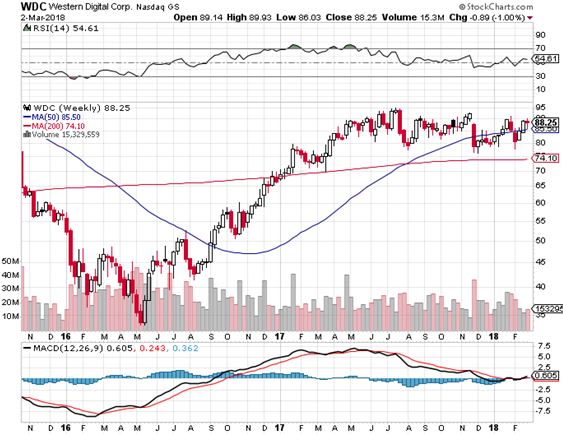
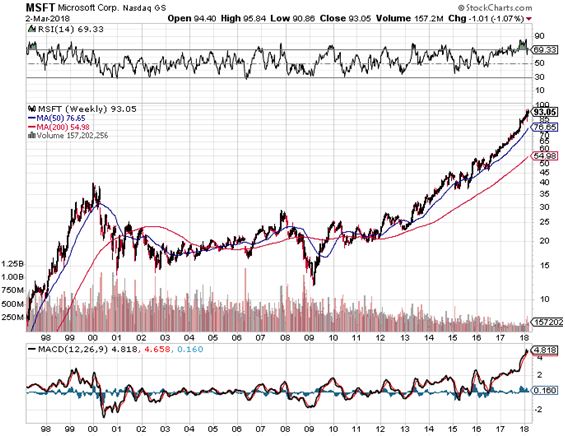
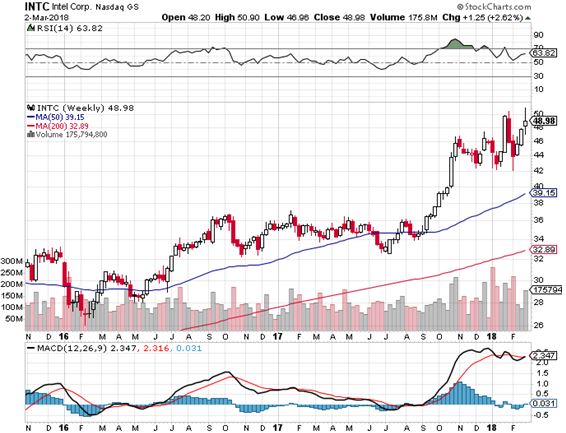
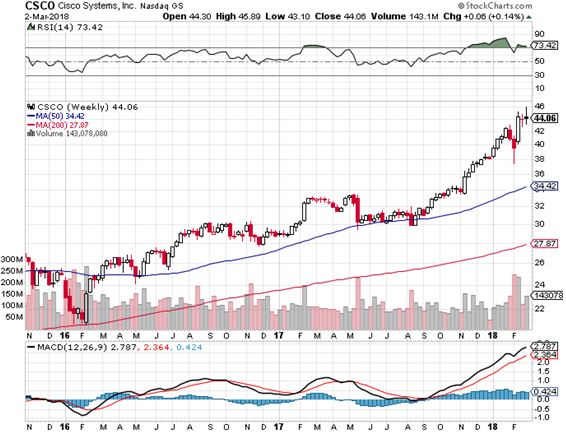
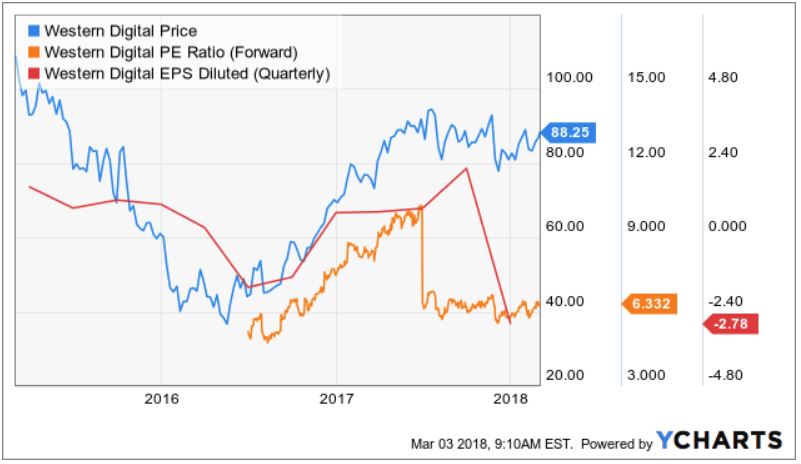
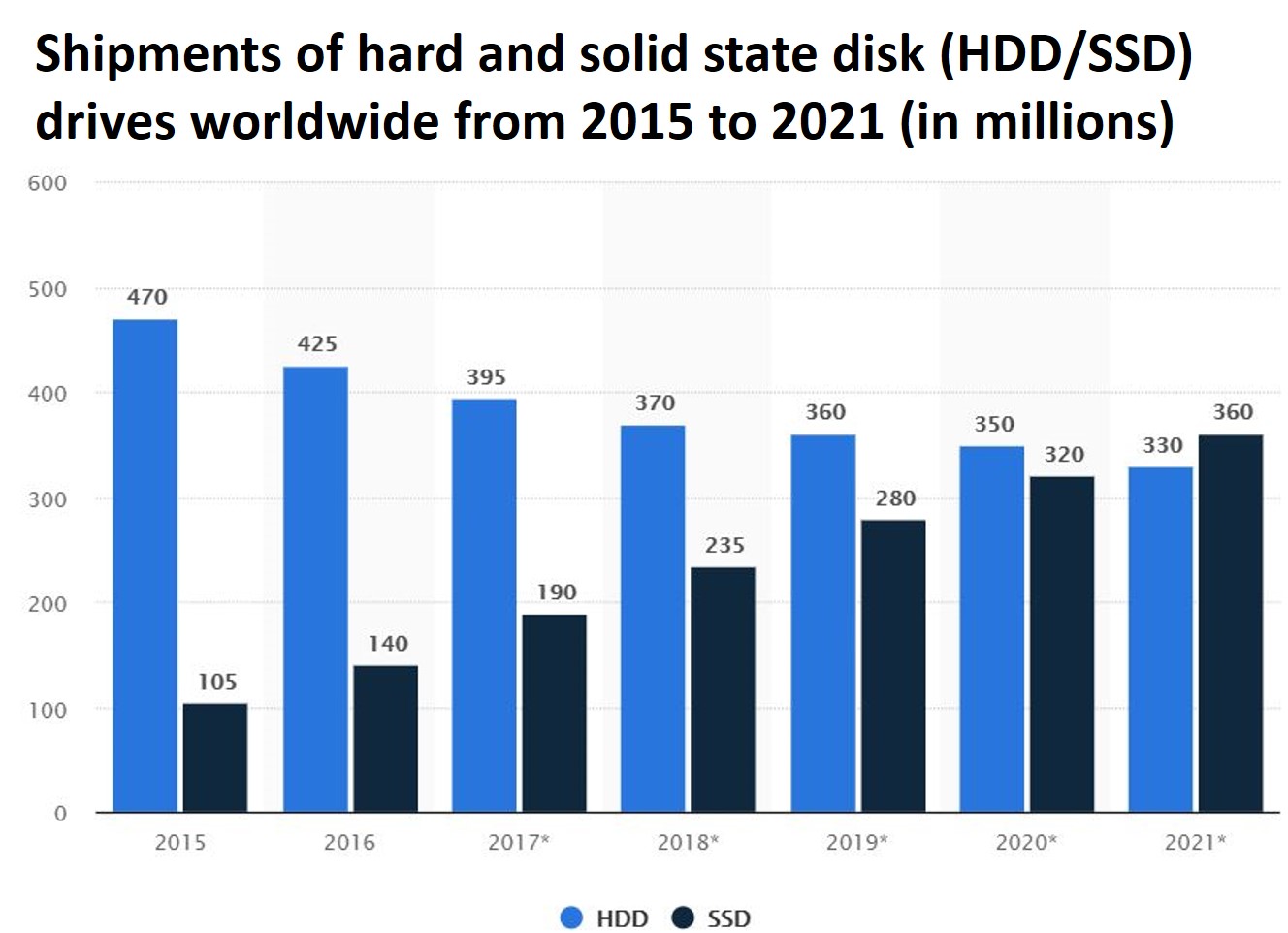

Mad Hedge Technology Letter
March 2, 2018
Fiat Lux
Featured Trade:
(WHEN WILL THE GOVERNMENT HAVE TO KILL A FANG?),
(FB), (AAPL), (NFLX), (GOOGL), (AMZN), (TWTR)
By now, we all have major over weightings of FANG's in our retirement portfolios. And the greatest threat to those holdings is the prospect of imminent government regulation.
The prospect of government involvement in the FANG's should therefore be more of just passing interest to us.
The relationship between large cap tech companies and the US government is not exactly a match made in heaven.
The hot button political topic of the day is how Russia used Facebook (FB) to influence the US presidential election. (FB) in effect lowered the drawbridge to allow our foreign enemies to come flooding in, and no one noticed until it was too late.
In fact, to say that government and tech are constantly butting heads would be an understatement. However, not all governments are created the same.
China's government has built a formidable moat around their tech industry, granting priority only to local firms and shutting out the rest. Notice that Alphabet (GOOGL) closed its offices in China five years ago.
Europeans have stuck with the school teacher approach by punishing their pupils individually. But the school itself has bigger sway in the grand scheme of things.
Broad based guidelines from the European Commission were handed down today dictating that Google (GOOGL), Facebook, and Twitter (TWTR) have one hour to remove unsavory content from their platforms, or else.
Keep in mind, these new protocols are "voluntary" and follow a series of other "voluntary" self-regulating precepts.
FANG's are still not accountable for anything posted on their platform and are thus insulated from liability. The notion that FANG's will self-police their own platform still pervades through official channels.
Fining FANG's appear authoritative enough to diverse political constituencies, but cash isn't a problem for FANG's. Each one is a mere slap on the wrist.
Preventing a FANG's unstoppable business model is the only solution and that will never happen.
Obviously, the E.U. have a sluggish grasp of how Fang's actually work.
FANG's are an entirely American made creation. Government, by and large, subscribing to the wonders of dynamic market forces, allowed the contest to play out in the trenches and not behind the scenes.
America's hyper competitive business model is also a graveyard littered with once promising tech companies, like MySpace, Napster, and Blackberry's (BB) mobile phone division.
The hope is that FANG model will continue to naturally evolve and self-regulate.
The big takeaway from government is that regulating big tech is a complicated issue. And government will deflect responsibility if pressured into destroying a Fang.
In essence, the net benefit of keeping the FANG's around could be greater than the net cost of getting rid of them for a sovereign nation, especially the consumer.
Today, FANG's are untouchable in cloud services, social media, search capability, e-commerce, advertising, tablets and mobile. The modern economy can't function without them.
Google and Facebook are observing and tracking every user's move, and that feedback is following through back to their reservoir of big data.
The colossal data profile they possess on each individual deduces users' hobbies, purchases, search trends, browsing patterns, location history, and loads more, even sexual orientation.
This probing system refines their hyper-targeting model, which has many unintended consequences, such as the ability to weaponize parts of the platform by rogue elements.
Fixing this problem is challenging and it's possible there are no good fixes out there at all. Jack Dorsey pleaded to users today to give suggestions on making Twitter a better user experience.
He knows the increased pace of weaponization on his platform will ultimately come back to haunt him as the CEO.
FANG's apply user data as inputs for evolving Artificial Intelligence (AI) consisting of a collection of filters. This check lists controls the content that pops up on to your screen based on the structure of finely tuned algorithms.
Google and Facebook (FB) offer the highest quality hyper-targeting in the world and advertisers pay for that quality.
If a negative unintended consequence transpires from a rogue algorithm, the FANG's have proved adept at paying lip service to the right actors to stave off the heat for another day. Kicking the can down the road seems to be their long-term strategy.
Complicating the mess is the fact that 100% of the blame cannot be directly pinned on an unknowing FANG if a team of nefarious hackers cause a ruckus from their computers in some distant land.
The fundamental idea of profit through data privacy and accumulation violently conflicts with the FANG's core business aspirations: hyper-targeted advertising based on increasingly intrusive personal surveillance. They will not change themselves if it means hindering their profitability.
Who would?
One challenge that the American government must hurdle is understanding the magnitude of the situation at hand. Do our politicians understand how to instill more algorithmic accountability and instill privacy policy transparency?
Effectively, playing Tech God is a slippery slope to go down. It's easier said than done, and there are many moving parts to this game. American big government is not ready to destroy a FANG in the land of free enterprise.
You can kiss the nine-year equity bull market good-bye if the government actually kills off Facebook or a Google!
The consensus view is the FANG's will continue to increase our standard of living.
Accelerating additional hyper-targeting, greater algorithmic favoritism, squashing competition and widespread erosion of adjacent industries. And most importantly for investors - higher profits and share prices.
Consumers have benefited immensely from all these free services. It's the competition that's complaining because they aren't FANG's themselves. Life must feel very unfair if you don't have the same tools as FANG companies.
Amazon was clever enough to take profits from their Amazon Web Services (AWS) division to bolster their loss-making e-commerce division. In the process, they crushed American brick and mortar retail.
Shareholders call this genius, while competitors and politicians call this a breach of anti-trust.
Any regulatory blow back that results in a dip of share prices should therefore be bought once the dust settles.
That day could be sometime in the far future, but there will be many twists and turns until we arrive there.
Investors need to ask themselves, does the government have the authority and the determination to ruin a FANG? The answer is no.
What the government is telling investors is they will dabble with the bare minimum of token regulation, but aren't ready to drop the guillotine on large cap tech. The long-term secular growth story is still intact albeit with occasional regulatory friction.
Every dip will be bought by investors queued up for years patiently waiting for an entry point, and the shares upside will be tapered by occasional regulatory headlines.
Regulation will never amount to more than that.
When John identifies a strategic exit point, he will send you an alert with specific trade information as to what security to sell, when to sell it, and at what price. Most often, it will be to TAKE PROFITS, but, on rare occasions, it will be to exercise a STOP LOSS at a predetermined price to adhere to strict risk management discipline. Read more
Legal Disclaimer
There is a very high degree of risk involved in trading. Past results are not indicative of future returns. MadHedgeFundTrader.com and all individuals affiliated with this site assume no responsibilities for your trading and investment results. The indicators, strategies, columns, articles and all other features are for educational purposes only and should not be construed as investment advice. Information for futures trading observations are obtained from sources believed to be reliable, but we do not warrant its completeness or accuracy, or warrant any results from the use of the information. Your use of the trading observations is entirely at your own risk and it is your sole responsibility to evaluate the accuracy, completeness and usefulness of the information. You must assess the risk of any trade with your broker and make your own independent decisions regarding any securities mentioned herein. Affiliates of MadHedgeFundTrader.com may have a position or effect transactions in the securities described herein (or options thereon) and/or otherwise employ trading strategies that may be consistent or inconsistent with the provided strategies.
